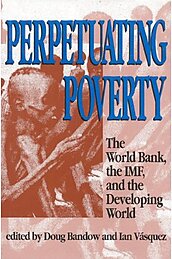For years, the assumption of traditional development economics was that the Third World was poor because it lacked capital. Thus, the suggested solution was to transfer wealth from the developed to the developing world. Since the private sector was believed to be unwilling or unable to bring prosperity to the poorest regions of the globe, governments had to plan and manage their nations’ economies. And foreign aid would enable recipients to plan and manage better. Alas, more than 40 years of international transfers have not benefited the Third World. Not only is foreign aid based on a flawed model of development, but there are other, more practical problems inherent to such transfer programs. One is that most development institutions, including multilateral aid agencies, lend to governments, not people. Thus, the IMF, World Bank, and other development banks have consistently made loans to the very Third World governments that have created the worst impediments to economic growth.
Perpetuating Poverty: The World Bank, the IMF, and the Developing World
About the Book
About the Editors
Doug Bandow is a senior fellow at the Cato Institute, specializing in foreign policy and civil liberties. He worked as special assistant to President Reagan and editor of the political magazine Inquiry. He writes regularly for leading publications such as Fortune magazine, National Interest, the Wall Street Journal, and the Washington Times. Ian Vásquez is the director of the Cato Institute’s Center for Global Liberty and Prosperity. He is a member of the Mont Pelerin Society and has been a term member of the Council on Foreign Relations. Prior to joining the Cato Institute in 1992, Vásquez worked on inter-American issues at the Center for Strategic and International Studies and Caribbean/Latin American Action. His articles have appeared in newspapers throughout the United States and Latin America including the Wall Street Journal, the Washington Times, the Miami Herald, the Financial Times, Investors’ Business Daily, El Comercio (Peru), El Economista (Mexico), El Mercurio (Chile), and El Nuevo Herald (U.S.).
